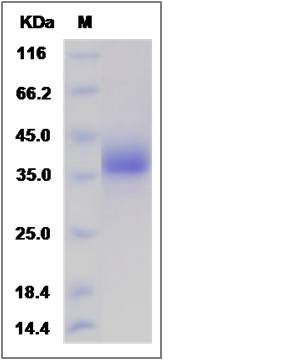Rat LILRA5 Protein (His Tag)
LILRA5
- 100ug (NPP2857) Please inquiry
| Catalog Number | P80334-R08H |
|---|---|
| Organism Species | Rat |
| Host | Human Cells |
| Synonyms | LILRA5 |
| Molecular Weight | The recombinant rat LILRA5 comprises 243 amino acids and predicts a molecular mass of 27.2 kDa. The apparent molecular mass of the recombinant protein is approximately 37 kDa in SDS-PAGE under reducing conditions due to glycosylation. |
| predicted N | Gln 17 |
| SDS-PAGE |  |
| Purity | > 90 % as determined by SDS-PAGE |
| Protein Construction | A DNA sequence encoding the rat LILRA5 (D4A6Y0) (Met1-Asn248) was expressed, fused with a polyhistidine tag at the C-terminus. |
| Bio-activity | |
| Research Area | Immunology |Signal Transduction |ITIM/ITAM Immunoreceptors and Related Molecules |
| Formulation | Lyophilized from sterile PBS, pH 7.4 1. Normally 5 % - 8 % trehalose, mannitol and 0.01% Tween80 are added as protectants before lyophilization. Specific concentrations are included in the hardcopy of COA. |
| Background | LILRA5 is a member of the leukocyte immunoglobulin-like receptor (LIR) family. LILR are a family of receptors possessing extracellular immunoglobulin domains. They are also known as CD85, ILTs and LIR, and can exert immunomodulatory effects on a wide range of immune cells. ILT-11 contains 2 Ig-like C2-type (immunoglobulin-like) domains. It can be detected n tissues of the hematopoietic system, including bone marrow, spleen, lymph node and peripheral leukocytes. Crosslink of ILT-11 on the surface of monocytes has been shown to induce calcium flux and secretion of several proinflammatory cytokines, which suggests the roles of this protein in triggering innate immune responses. |
| Reference |
